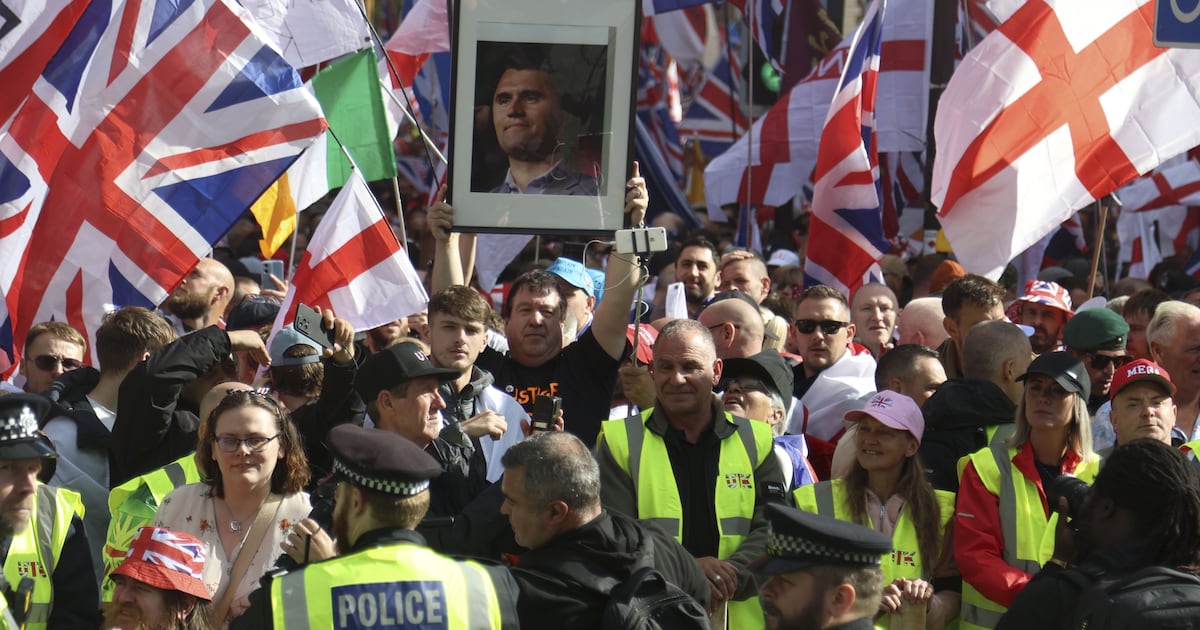Politics
150,000 March in London: Far-Right Rally Sparks Controversy

A significant gathering took place in central London on March 2, 2024, as approximately 150,000 people participated in a march organized by far-right activist Tommy Robinson. The event, branded as the “Unite the Kingdom” march, drew attention for its size and the controversial figures associated with it, including a video address from entrepreneur Elon Musk.
Protesters expressed a range of sentiments, prominently displaying Union Jacks and St George’s crosses, while chanting slogans such as “Whose streets? Our streets.” The atmosphere, however, became increasingly hostile, with references to historical figures like Hitler and the Nazis emerging during the event. A counter-protest also formed, highlighting the ongoing clash between far-right and leftist ideologies.
The political landscape in the UK has been charged, with both the Labour Party and the Conservative Party polling below 40 percent. This dissatisfaction has led many individuals to seek alternative forms of political expression, as evidenced by the turnout at the march. Robinson has capitalized on rising anxieties regarding immigration and societal change, reflected in recent protests outside asylum hotels in Britain.
In an unexpected twist, the Irish Tricolour was prominently displayed among the crowd, signifying a cross-border dimension to the issues being raised. This inclusion raises questions about the political climate in Ireland, where similar sentiments have been expressed in recent months. The impact of social media on shaping these dialogues cannot be overlooked, as platforms have blurred the lines between national contexts, creating a unified front of discontent.
Political Climate Sparks Division
The protests resonate with a backdrop of heightened tensions in both Britain and Ireland. Following the riots in Dublin in November 2023, which foreshadowed the larger-scale demonstrations in England, there is a palpable sense of urgency within these movements. The Irish, while often perceived as a distinct group, find themselves intertwined with the issues at hand, particularly concerning immigration from regions like the Middle East.
The recent political environment has left many feeling unheard by the establishment. The rise of figures like Nigel Farage and his party, Reform UK, has not satisfied all factions of the right, indicating a desire for more radical change among some protesters. For many, the establishment is viewed as failing to address their concerns, leading them to seek more extreme voices.
As the march unfolded in Westminster on that rainy Saturday, the atmosphere was charged with frustration, shaped by a political discourse that often overlooks the nuances of each nation’s challenges. Many participants expressed a desire for immediate action, influenced by a growing perception that their voices are not being adequately represented in traditional political avenues.
The resonating chants and visible symbols of national pride reflect a broader narrative that has gained momentum across borders. The contentious nature of the protest illustrates the complexities of identity, belonging, and the anxieties surrounding immigration.
The Role of Social Media in Political Expression
Social media has played a vital role in amplifying these sentiments, allowing for rapid dissemination of ideas and fostering a sense of community among those who feel disenfranchised. The online platforms have created a space where grievances can be shared, often in a manner that transcends national boundaries. This has resulted in a collective frustration that manifests in public demonstrations, as seen during the London march.
The presence of the Irish Tricolour, alongside symbols from the UK, underscores the interconnected nature of these movements. Both groups share a growing concern about immigration policies and societal changes, leading to a convergence of frustrations that may have previously remained isolated within their respective borders.
As the political landscape continues to evolve, the implications of such gatherings and their underlying messages will be crucial in understanding the future trajectory of both the UK and Ireland. The march represented not only a reaction to immediate issues but also a reflection of deeper societal rifts that challenge the established political order.
The convergence of these sentiments, showcased through the protests, signals an important moment in the ongoing discussion about national identity, immigration, and the role of the political establishment in addressing the concerns of its citizens.
-

 Top Stories3 months ago
Top Stories3 months agoTributes Surge for 9-Year-Old Leon Briody After Cancer Battle
-

 Entertainment4 months ago
Entertainment4 months agoAimee Osbourne Joins Family for Emotional Tribute to Ozzy
-

 Politics4 months ago
Politics4 months agoDanny Healy-Rae Considers Complaint After Altercation with Garda
-

 Top Stories4 months ago
Top Stories4 months agoIreland Enjoys Summer Heat as Hurricane Erin Approaches Atlantic
-

 World5 months ago
World5 months agoHawaii Commemorates 80 Years Since Hiroshima Bombing with Ceremony
-

 Top Stories3 months ago
Top Stories3 months agoNewcastle West Woman Patricia Foley Found Safe After Urgent Search
-

 Top Stories5 months ago
Top Stories5 months agoFianna Fáil TDs Urgently Consider Maire Geoghegan-Quinn for Presidency
-

 World5 months ago
World5 months agoCouple Convicted of Murdering Two-Year-Old Grandson in Wales
-

 World5 months ago
World5 months agoGaza Aid Distribution Tragedy: 20 Killed Amid Ongoing Violence
-

 World5 months ago
World5 months agoAristocrat Constance Marten and Partner Convicted of Infant Murder
-

 Top Stories4 months ago
Top Stories4 months agoClimbing Errigal: A Must-Do Summer Adventure in Donegal
-

 Top Stories4 months ago
Top Stories4 months agoHike Donegal’s Errigal Mountain NOW for Unforgettable Summer Views









